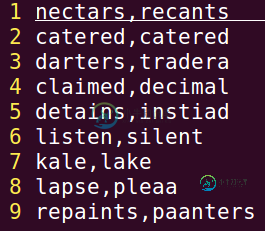python使用正则筛选信用卡
本文实例为大家分享了python使用正则筛选信用卡的具体代码,供大家参考,具体内容如下
本文来源于两个简单的题目:
1.判断一对单词是否是" Anagrams "
2.判断信用卡是否合理
判断 Anagramsstrong>
anagrams 的百度翻译:由颠倒字母顺序而构成的字(短语)
而题目给出例子:
[ DOG , ODG ]
[ DOG , DOG ]
[ DOG , GOD ]
[ DOG , GDO ]
均为 anagrams 。
那思路就简单了,直接拆分字母,排序,比较就 ok 。
判断信用卡
题目给出的要求如下:
The criteria are:
• It must start with a 4,5 or 6
• It must be exactly 16 digits
• It must be numbers only
• It can have a digits in groups of 4, separated by one hyphen “-“
• It should not contain any other characters.
• It must NOT have any 4 repeated digits.
样例输出如下:
378282246310005 Invalid
30569309025904 Invalid
6011111111111117 Invalid
5123-2332-3232-3213 valid
py文件
两个题目合并在一个 py 文件中。
而入参数分别是两个文件的名字,一个是 anagram.txt ,另一个是 credit_cards.txt ,他们分别长这样:


最后的程序长这样:
#! /usr/bin/python3 import re ############################### ##You need to implet the following methods: ## ##Question 1 ##anagram_validator() ## ##Question 2 ##credit_card_validator() ################################ ################################################### # Question 1: Check for anagrams:# ################################################### def get_list(src_str): sub_list=[] word_tmp='' for word in src_str: if word != ',': word_tmp = word_tmp+word else: sub_list.append(word_tmp) word_tmp = '' return sub_list def read_anagram(file_name): ''' Input: a file name Return: a nested list of two words list Example : [[word1,word2],[word3,word4]...etc] ''' with open(file_name,encoding = 'utf-8') as f: return_list =[] file_conment = f.read() file_conment_new = re.sub(r'\n',',',file_conment) file_conment_new = file_conment_new+',' subs_list = get_list(file_conment_new) i=0 while i < (len(subs_list)-1): return_list.append([subs_list[i],subs_list[i+1]]) i=i+2 return return_list def anagram_validator(anagram): ''' Input is the output from "read_anagram()". Return: list of "anagrams" or "Not anagrams" values for each two words example input (dog,gdo),(try,elm) then output would be ["anagrams","Not anagrams"] with sequence of the input ''' result_list=[] for i in range(len(anagram)): word_font = ''.join((lambda x:(x.sort(),x)[1])(list(anagram[i][0]))) word_back = ''.join((lambda x:(x.sort(),x)[1])(list(anagram[i][1]))) if word_font == word_back: result_list.append('Anagrams') else: result_list.append('Not anagrams') return result_list ############################################ # Question 2: Validate credit cards # ############################################ def read_credit_cards(file_name): ''' Input: a file name Return tuple of numbers ''' with open(file_name,encoding='utf-8') as f: card_conment = f.read() card_conment = re.sub(r'\[','',card_conment) card_conment = re.sub(r'\]','',card_conment) card_conment = card_conment+',' card_list = get_list(card_conment) return tuple(card_list) def credit_card_validator(numbers): ''' Input: tuple of numbers Return:dictionary of credit card numbers where key is the number and value if valid or invalid ''' validator_list=[] credit_dict={} for i in range(len(numbers)): validator_list.append(numbers[i]) for i in range(len(numbers)): ch_num = 0 repeat_flag = 0 for ch in validator_list[i]: if ord("A")<=ord(ch)<=ord("Z"): ch_num+=1 break tmp_list = [] tmp_list = (re.sub(r"[^\d]", "", validator_list[i])) for index in range(len(tmp_list)-4): if(tmp_list[index] == tmp_list[index+1] and tmp_list[index] == tmp_list[index+2] and tmp_list[index] == tmp_list[index+3] ): repeat_flag = 1 break; if(validator_list[i][0] != '4' and validator_list[i][0] != '5' and validator_list[i][0] != '6' ): credit_dict[validator_list[i]]='Invalid' elif( len(re.sub(r"\D", "", validator_list[i])) != 16 ): credit_dict[validator_list[i]]='Invalid' elif(ch_num > 0): credit_dict[validator_list[i]]='Invalid' elif( (re.search(r"-",validator_list[i])) and ( validator_list[i][4] != '-' or validator_list[i][9] != '-'or validator_list[i][14] != '-' ) ): credit_dict[validator_list[i]]='Invalid' elif(re.search(r"[^-\d]",validator_list[i])): credit_dict[validator_list[i]]='Invalid' elif(repeat_flag == 1 ): credit_dict[validator_list[i]]='Invalid' else : credit_dict[validator_list[i]]='Valid' space_str = '' return credit_dict def print_credit_card_summary(dict_o): ''' Input: dict Return: printing summary of validation result - space between credit card and status is 40 width example: 378282246310005 Invalid 30569309025904 Invalid ''' space_str = '' for key in dict_o: new_str = key + dict_o[key] if(dict_o[key] == "Valid"): new_str_tmp = new_str[:-5] space_lenth = 46-len(new_str) for x in range(space_lenth): space_str +=' ' print(new_str_tmp + space_str + 'Valid') space_str='' else : new_str_tmp = new_str[:-7] space_lenth = 48-len(new_str) for x in range(space_lenth): space_str +=' ' print(new_str_tmp + space_str + 'Invalid') space_str='' ####### THE CODE BELOW IS FOR TESTING################### ############### DO NOT CHANGE ######################### import sys if __name__ == '__main__': # Take care of the console inputs if len(sys.argv) <= 1: sys.argv = ['', "anagram.txt", "credit_cards.txt"] stars = '*' * 40 print(stars) print("Testing Question 1 --- Anagrams?") print(stars) # testing reading_anagrams try: anagram = read_anagram(sys.argv[1]) if not anagram: print("read_anagram() returns None.") else: print("anagram: ", anagram) print() except Exception as e: print("Error (readnumbers()): ", e) # testing anagram_validator Anagrams = 0 NAnagrams = 0 try: if not anagram: # Question 1 has not been implemented print("anagram_validator() skipped....") else: result = anagram_validator(anagram) if result == None: print("anagram_validator() returns None.") else: for i in result: if i == "Anagrams": Anagrams += 1 elif i == "Not anagrams": NAnagrams += 1 print("Number of valid Anagrams is {} and Not anagrams is {}.".format(Anagrams, NAnagrams)) except Exception as e: print("Error (anagram_validator()):", e) # testing Question 2 print("\n\n" + stars) print("Testing Question 2 --- Credit Card Validator") print(stars) # Testing reading_credit_cards try: tup = read_credit_cards(sys.argv[2]) if not tup: print("read_credit_cards() returns None.") else: print("The tuple of credit_cards: {}".format(tup)) except Exception as e: print("Error (read_credit_cards()):", e) # Testing credit_card_validator vcc = 0 ivcc = 0 try: if not tup: # Readin_Question 2 has not been implemented print("credit_card_validator() skipped...") else: cc_dict = credit_card_validator(tup) tmp_cc_dict = cc_dict if not cc_dict: print("credit_card_validator() returns None.") else: for items in cc_dict.keys(): if cc_dict[items] == "Valid": vcc += 1 elif cc_dict[items] == "Invalid": ivcc += 1 print("Number of valid credit cards is {} and invalid {}.".format(vcc, ivcc)) except Exception as e: print("Error (credit_card_validator()):", e) # testing Question 2 print("\n\n" + stars) print("Testing Question 2b --- Print Credit Card Summary") print(stars) # Testing print_credit_card_summary try: if not tmp_cc_dict: # Dict credit card output has not been implemented print("print_credit_card_summary() skipped...") else: import io # do not delete this line from contextlib import redirect_stdout # do not delete this line f = io.StringIO() with redirect_stdout(f): print_credit_card_summary(tmp_cc_dict) out = f.getvalue() if not out: print("print_credit_card_summary() returns None.") else: count44 = 0 count46 = 0 for line in out.splitlines(): if len(line) - len(line.split()) == 44: count44 += 1 elif len(line) - len(line.split()) == 46: count46 += 1 if count44 == vcc and count46 == ivcc: print("Your format looks good") else: print("You might have some issues in your summary format") except Exception as e: print("Error (print_credit_card_summary()):", e)
以上就是本文的全部内容,希望对大家的学习有所帮助,也希望大家多多支持小牛知识库。
-
本文向大家介绍python 用正则表达式筛选文本信息的实例,包括了python 用正则表达式筛选文本信息的实例的使用技巧和注意事项,需要的朋友参考一下 本文主要介绍如何对多个文本进行读取,并采用正则表达式对其中的信息进行筛选,将筛选出来的信息存写到一个新文本。 文本基础操作 打开文件:open(‘文件名',‘打开方式')>>>file=open(r'C:\Users\yuanlei\Desktop
-
本文向大家介绍PowerShell中使用正则表达式筛选数组实例,包括了PowerShell中使用正则表达式筛选数组实例的使用技巧和注意事项,需要的朋友参考一下 本文介绍PowerShell中使用match操作符,配合正则表达式从数组中筛选出想要的内容。 先看下面这个例子: 我们知道ipconfig是显示当前计算机的TCP/IP配置信息的,其中有一项是IP地址。如果有多个网卡,或者一个网站上配置有多
-
我在正确表达ElasticSearch regexp过滤器的regexp时遇到了问题。我正在尝试匹配url字段中“info-for/media”中的任何内容,例如http://mydomain.co.uk/info-for/media/press-release-1。为了尝试获得正确的正则表达式,我现在使用,但最终将是带有用户查询字符串的。 发布到localhost:9200/_search 这返
-
本文向大家介绍Python使用re模块实现信息筛选的方法,包括了Python使用re模块实现信息筛选的方法的使用技巧和注意事项,需要的朋友参考一下 本文实例讲述了Python使用re模块实现信息筛选的方法。分享给大家供大家参考,具体如下: 背景 平时工作中,我们经常会处理大量的元数据(Raw Data),而一般的文件编辑器只能一次查询一个关键字,这就难以连续的分析元数据,比如分析产品日志文件(lo
-
我的页面中有一个名为“search_table”的DataTable。我在表中有一个附加的标题行,它具有不同的筛选选项(dropdown、text、date_pickers)。对于日期列,我有两个datepicker,一个用于min,一个用于max。我可以根据datepickers为datatable筛选数据,但有一个问题: 当我选择一个日期时,我的表中的所有行都消失了,我必须点击其中的一个标题(
-
我有一个带有FireBaseRecyclerAdapter的RecyclerView。当用户开始输入SearchView时,我想用一个名称列表填充RecycerView。 也是对查询进行忽略的方法吗?

